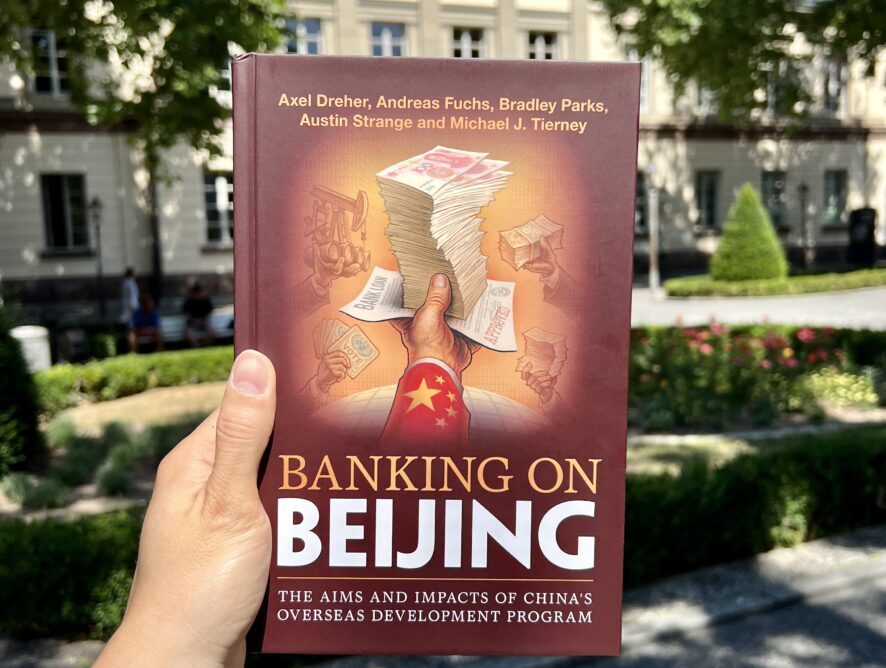Banking on Beijing: The Aims and Impacts of China’s Overseas Development Program
April 2022
DOI: 10.1017/9781108564496
ISBN: 9781108474108
This book explains China’s transformation from ‘benefactor’ to ‘banker’ in its relationship with developing countries and traces the impacts of this change.
China is now the lender of first resort for much of the developing world, but Beijing has fueled speculation among policymakers, scholars, and journalists by shrouding its grant-giving and lending activities in secrecy. Introducing a systematic and transparent method of tracking Chinese development projects around the world, this book explains Beijing’s motives and analyzes the intended and unintended effects of its overseas investments. Whereas China almost exclusively provided aid during the twentieth century, its twenty-first century transition from ‘benefactor’ to ‘banker’ has had far-reaching impacts in low-income and middle-income countries that are not widely understood. Its use of debt rather than aid to bankroll big-ticket infrastructure projects creates new opportunities for developing countries to achieve rapid socio-economic gains, but it has also introduced major risks, such as corruption, political capture, and conflict.
Banking on Beijing is the outcome of almost a decade’s painstaking work by its authors since the AidData project was launched in April 2013 in Washington. While initially based on mass media data, the authors have improved the methodology by conducting triangular checks on project level data in great detail, teasing out unreliable data or double counting, to create a comprehensive, decent quality project level database (especially its version 2.0) covering 13,427 Chinese ODA- and OOF-financed projects in 165 countries between 2000–2017. Each project has at least ten informative features or variables, including its starting and completing dates, types, level of concessionality, sources of finance and amount of finance. The work led by the authors has greatly promoted transparency, accountability and governance, and has enabled better coordination and knowledge dissemination across governments, international organizations, think tanks and researchers. This open data work is indispensable.
Press Reviews
‘This is an excellent book that analyses China’s overseas development program from various angles; it will be essential reading for anyone seeking a fresh and in-depth take on the topic. This ground-breaking work strengthens the evidentiary foundation for assessing both the aims and impacts of China’s overseas development program, bridging the gap in the knowledge of this subject matter. This book is organised, comprehensive, and effectively written. In addition, the data provided by this book is very beneficial for general readers and developing countries interacting with China. Finally, this book will serve at the forefront of excellence for the future generation of Chinese overseas development program researchers.’ Charles Ho Wang Mak, Butterworths Journal of International Banking and Financial Law
‘Banking on Beijing directs a spotlight on a hot policy issue: China’s development aid and lending. The authors subject assumptions and anecdotes to the hard test of data – examining almost 4500 projects, involving $358 billion, in 138 countries, over 15 years. They identify humanitarian and commercial motivations, diverse means and ends, risks and gains, and similarities and contrasts with other countries’ assistance. The book concludes that China is ‘neither hero nor villain, ‘ but a financing reality that the world should analyze with comprehensive, transparent data. This pathbreaking Open Data work should help developing countries that are dealing with China, international donors and lenders, and even further an improvement in China’s policy.’ Robert B. Zoellick, Former President of the World Bank, US Trade Representative, and Deputy Secretary of State
‘The emergence of China as a major development financier to Africa and other developing countries to support their infrastructure projects is one of the most important forces shaping the global development landscape in the twenty-first century. This book, analyzing newly available AidData and coauthored by five established scholars, provides authoritative, objective and quantitative assessments of the development impacts of those projects on their host countries. It is a must read for anyone concerned about China’s new role in the global development community and the future development in the recipient countries of China’s infrastructure projects.’ Justin Yifu Lin, Dean of the Institute of New Structural Economics at Peking University and Former Chief Economist of the World Bank
About the authors
**We are proud to announce that our CeMEAS Director Prof. Dr. Andreas Fuchs (University of Goettingen) and his fellow colleagues finally published their work over 10 years in the making!**
Axel Dreher is Professor of International and Development Politics, Universität Heidelberg, Heidelberg, Germany. He is also a Fellow at CEPR, CESifo, and AidData.
Andreas Fuchs is Professor of Development Economics and Director of the Centre for Modern East Asian Studies at the Georg-August-Universität, Göttingen, Germany. He is also Director of the Kiel Institute China Initiative.
Bradley Parks is the Executive Director of AidData, a research lab at William & Mary, Virginia. He is also a Non-Resident Fellow at the Center for Global Development.
Austin Strange is an Assistant Professor of International Relations at The University of Hong Kong.
Michael J. Tierney is Professor of Government and Director of the Global Research Institute at William & Mary, Virginia.
.
This book will be of interest to policymakers, students and scholars of international political economy, Chinese politics and foreign policy, economic development, and international relations.
Please visit the website of Cambridge University Press for more information.


